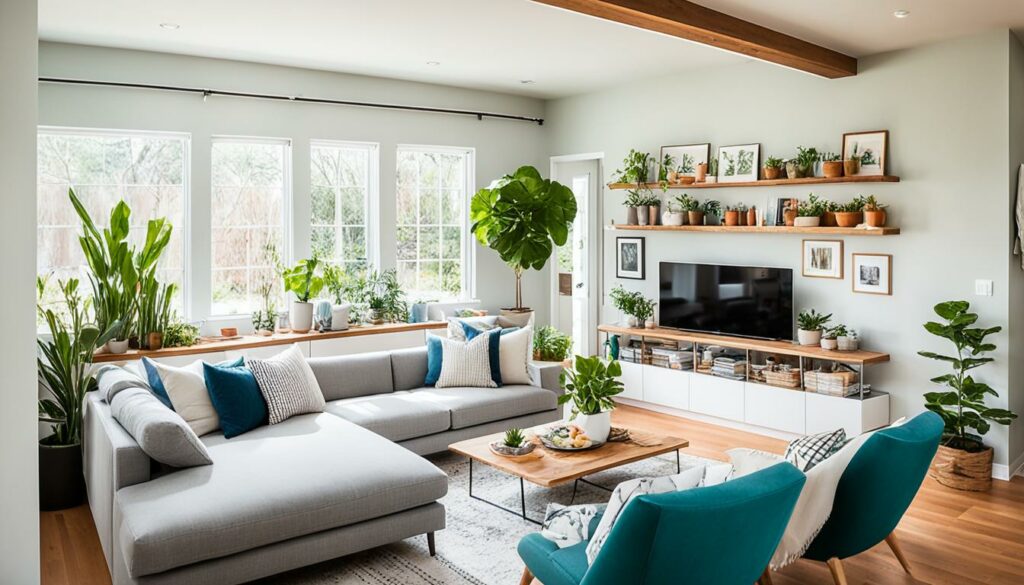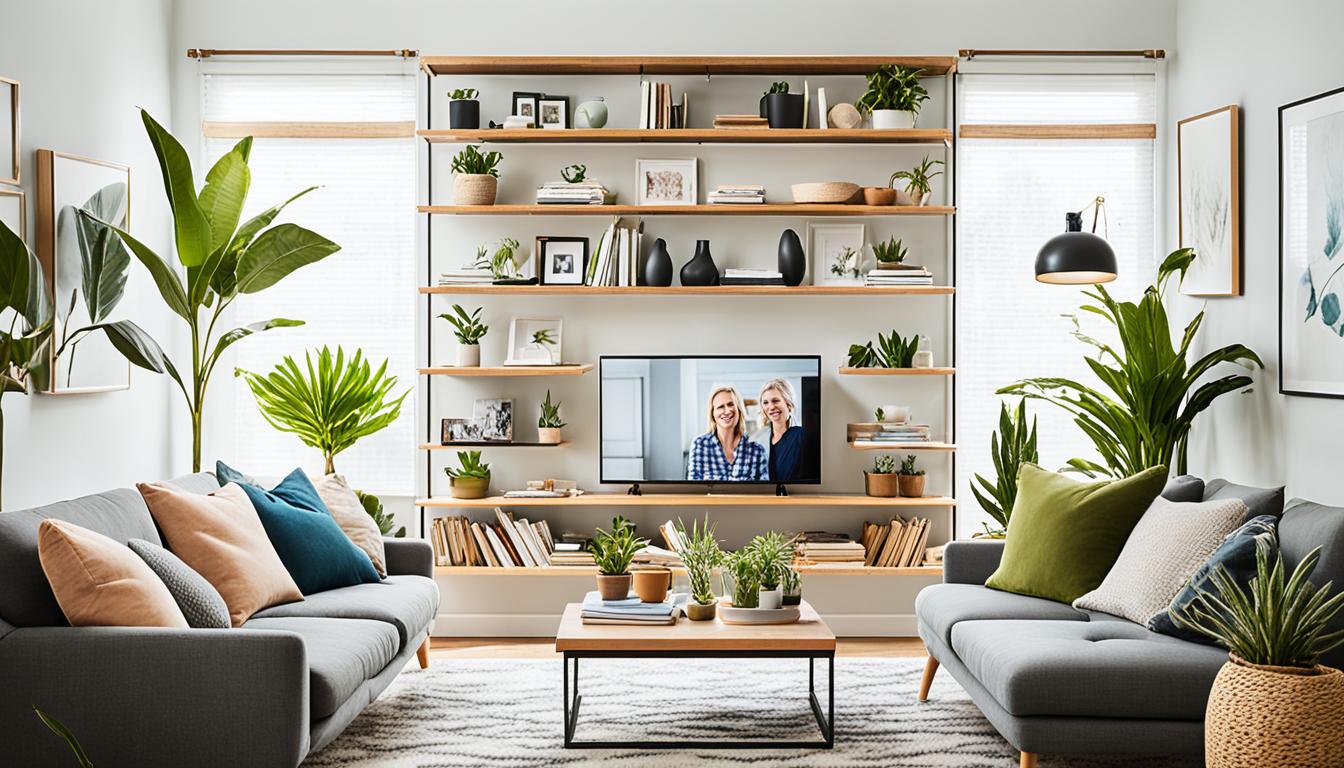Can divorced couples live together under the same roof after ending their marriage? This unconventional arrangement may seem puzzling at first, but it has become an increasingly popular choice for many individuals navigating the complexities of post-divorce life. Sharing a home after divorce offers various benefits, including shared parenting responsibilities and minimized financial burdens. However, there are legal implications and potential challenges that arise from cohabitating after divorce, making it a subject of intrigue and debate.
Key Takeaways:
- Many divorced couples choose to live together for practical reasons, such as co-parenting and cost efficiency.
- Living together after divorce can have legal implications and potential challenges that need to be navigated.
- Clear communication, establishing boundaries, and seeking legal advice can contribute to a successful cohabitating arrangement.
- Living together after divorce works best for couples with an amicable relationship and a shared commitment to the well-being of all parties involved.
- The decision to live together after divorce should be based on individual circumstances and needs.
Reasons for Living Together After Divorce
While divorce often signifies the end of a marriage and the beginning of separate lives, some divorced couples choose to continue living together. There are several reasons why divorced couples may opt for this unconventional arrangement.
- Financial security: One of the primary reasons for divorced couples living together is the financial benefits it offers. By sharing household expenses, such as rent or mortgage payments, utility bills, and groceries, both individuals can achieve greater financial stability in a post-divorce situation.
- Co-parenting responsibilities: Living together after divorce allows divorced parents to maintain a consistent and stable environment for their children. By sharing the same household, co-parents can easily collaborate on parenting decisions, coordinate schedules, and provide emotional support to their children.
- Unresolved feelings: Divorce can be a complex and emotionally challenging process. In some cases, divorced couples may still have lingering feelings for each other and find it difficult to completely sever their ties. Living together may provide an opportunity for emotional support and a gradual transition into separate lives.
- Societal pressures: Divorced couples may face societal pressures that discourage or frown upon living alone. Cultural and family expectations, as well as financial constraints, can influence the decision to continue cohabitating after divorce.
- Shared property: Another factor that may influence divorced couples to live together is shared property or investments. It can be challenging to divide assets or sell jointly owned property immediately after a divorce. Living together allows both individuals more time and flexibility to navigate the process of dividing their shared assets.
In addition to these reasons, living together after divorce can offer various benefits. It can be cost-effective, providing financial stability and reducing living expenses for both individuals. It can also facilitate effective co-parenting and provide emotional support during the transition into new lives. However, this arrangement comes with its own set of challenges, and it’s crucial to carefully consider the individual circumstances and priorities before committing to such an arrangement.
Unconventional but Practical
“Living together after divorce can be an unconventional choice, but it can also be a practical solution for some divorced couples. It allows them to address financial concerns, maintain a stable environment for their children, and find emotional support during a significant life transition.” – Divorce counselor
Legal Considerations of Living Together After Divorce
Although divorce laws do not explicitly address cohabitation after divorce, there are important legal implications to consider when divorced couples choose to live together. One of the primary concerns relates to child support and alimony obligations.
When divorced parents live together, it can impact child support agreements. A court may view shared living arrangements as an alternative to providing financial support, potentially affecting the calculation of child support payments. Additionally, if one parent experiences a significant change in their financial circumstances, such as a decrease in income, the court may need to reevaluate the child support order to ensure fairness.
Similarly, cohabitation after divorce can also impact alimony obligations. Alimony, also known as spousal support, is often determined based on factors such as the parties’ respective incomes and financial needs. If divorced individuals choose to live together, it could potentially lead to a reassessment of the recipient’s financial needs and the duration or amount of alimony.
Given the potential legal ramifications of living together after divorce, it is advisable to consult with an experienced alimony lawyer. An alimony lawyer can provide valuable guidance and assistance in navigating the complex legal considerations. They can help individuals understand the potential effects of cohabitation on child support and alimony obligations, and help them navigate any necessary modifications through the court system.
Consulting an alimony lawyer is particularly important if the divorced couple has a formal child support or alimony agreement in place. The lawyer can review the existing agreement, provide legal advice on the implications of cohabitation, and help determine if any modifications should be pursued.
In addition to legal assistance, couples considering living together after divorce may also find it helpful to seek the advice of a family counselor or mediator. These professionals can provide guidance on the emotional and logistical challenges of cohabitation, helping the couple navigate potential conflicts and maintain a healthy living arrangement.
Benefits of Consulting an Alimony Lawyer
Consulting an alimony lawyer can provide a range of benefits, including:
- Expertise on divorce laws and regulations related to child support and alimony.
- Assistance in understanding the legal implications of cohabitation after divorce.
- Guidance on the potential impact of living together on child support and alimony obligations.
- Help in preparing and submitting any necessary legal modifications to court agreements.
- Representation in court proceedings, if needed, to address any disputes or conflicts that may arise.
By enlisting the help of an alimony lawyer, divorced couples can ensure their rights and obligations are protected and navigate the legal considerations of living together after divorce more effectively.
Next, we’ll explore the various pros and cons of living together after divorce to help individuals make an informed decision about this unique arrangement.
| Legal Considerations of Living Together After Divorce | Benefits of Consulting an Alimony Lawyer |
|---|---|
| Child support and alimony obligations may be impacted by shared living arrangements. | Expertise on divorce laws and regulations related to child support and alimony. |
| Court intervention may be required to modify child support obligations. | Assistance in understanding the legal implications of cohabitation after divorce. |
| Living together can lead to a reevaluation of alimony obligations. | Guidance on the potential impact of living together on child support and alimony. |
| Consulting an alimony lawyer can help navigate these legal considerations. | Help in preparing and submitting necessary legal modifications. |
| Representation in court proceedings, if needed. |

Pros and Cons of Living Together After Divorce
Living together after divorce can offer several advantages for couples seeking a new dynamic. It is essential to consider the benefits and drawbacks to make an informed decision. By weighing the pros and cons, divorced individuals can better understand the implications of cohabitation after divorce.
Advantages of Living Together After Divorce
One of the primary advantages of living together after divorce is the potential for cost efficiency. By sharing expenses, such as rent, utilities, and household chores, both individuals can alleviate financial burdens and maintain a higher standard of living.
Cohabitation after divorce also provides a conducive environment for easier co-parenting. With both parents residing in the same home, it becomes simpler to coordinate schedules, establish consistent routines, and foster a harmonious parenting approach. This arrangement can have a positive impact on the children’s emotional well-being.
Additionally, living together after divorce can offer emotional support during the transition period. Divorce can be emotionally challenging, and having a familiar presence in the same household can provide comfort, stability, and a sense of shared experiences.

Disadvantages of Divorced Couples Living Together
While there are advantages, there are also potential disadvantages to consider. One significant challenge is the difficulty of moving on and establishing new routines, identities, and independent lives. Living together may hinder the process of emotional healing and create obstacles to personal growth and development.
Another disadvantage is the limited privacy that comes with cohabitation after divorce. Individuals may find it challenging to navigate personal boundaries and regain a sense of autonomy, leading to feelings of intrusion or discomfort.
Moreover, emotional challenges can arise when living together after divorce. Lingering unresolved issues or unfulfilled expectations from the previous marriage may resurface, causing tension and strain on the living arrangement.
The Pros and Cons of Cohabitation After Divorce
Consider the following table to gain a comprehensive understanding of the pros and cons of living together after divorce:
| Pros of Cohabitation After Divorce | Cons of Cohabitation After Divorce |
|---|---|
| Cost efficiency through shared expenses | Difficulty in moving on and establishing independence |
| Easier co-parenting coordination | Limited privacy and personal boundaries |
| Emotional support during the transition | Resurfacing unresolved emotional challenges |
By examining the pros and cons, individuals can evaluate the specific advantages and disadvantages that resonate most with their unique circumstances. It is important to carefully weigh these factors before committing to living together after divorce.
Establishing Rules for Living Together While Divorcing
When divorced couples choose to live together after their separation, it is essential to establish clear rules and boundaries to ensure a harmonious living arrangement. These guidelines provide structure and help manage potential conflicts that may arise due to shared living spaces. By setting boundaries, both parties can navigate their new dynamic with clarity and respect.
Dividing Chores and Responsibilities
One important aspect of living together post-divorce is to divide chores and responsibilities fairly. Creating a schedule or agreed-upon tasks can help eliminate any ambiguity and ensure that each person contributes equally to the household. By sharing the workload, both individuals can feel a sense of fairness and contribute to a functional living situation.
Respecting Each Other’s Privacy
Respecting each other’s privacy is vital when cohabitating after divorce. It is essential to establish clear boundaries regarding personal space and privacy. Discussing expectations around privacy, such as knocking before entering each other’s rooms or respecting closed doors, can create a respectful and comfortable living environment for both parties.
Maintaining a Budget
Financial matters can be a sensitive topic for divorced couples living together. To avoid conflicts related to money, it is crucial to establish and maintain a budget. By openly discussing and agreeing upon financial responsibilities, such as splitting bills and managing expenses, it helps avoid unnecessary tension and promotes financial stability.
Avoiding Physical Intimacy
It is generally recommended to avoid physical intimacy when living together after divorce. Establishing boundaries in terms of romantic relationships is crucial to maintain respect and prevent confusion or emotional complications. This rule helps maintain clear expectations and promote a healthy cohabitation arrangement.
Maintaining a Civil Relationship
Living together after divorce requires maintaining a civil relationship. It is essential to communicate respectfully and resolve conflicts through peaceful discussions. By prioritizing effective communication and conflict resolution, both individuals can navigate their post-divorce journey with mutual respect and minimize unnecessary tension.
“Successful cohabitation after divorce requires clear rules, mutual respect, and open communication. By establishing boundaries for chores, privacy, finances, physical intimacy, and maintaining a civil relationship, divorced couples can create a stable and comfortable living environment.”
Seeking Couples Counseling or Therapy
For some divorced couples, seeking couples counseling or therapy sessions can be beneficial in navigating the challenges of living together after divorce. Professional guidance provides a neutral space to address emotional concerns, improve communication skills, and develop strategies for a healthier cohabitation arrangement.
Examples of Rules and Boundaries for Living Together After Divorce
| Rule | Description |
|---|---|
| Division of Chores | Create a fair schedule for household tasks, such as cleaning, cooking, and grocery shopping. |
| Respecting Privacy | Establish boundaries around personal space and privacy, knock before entering each other’s rooms, and respect closed doors. |
| Financial Responsibilities | Agree on how to split bills, manage expenses, and maintain a shared budget to avoid conflicts. |
| Avoiding Physical Intimacy | Establish clear boundaries around physical intimacy to prevent confusion or emotional complications. |
| Maintaining Respectful Communication | Practice open and respectful communication, resolve conflicts peacefully, and avoid unnecessary tension. |

Living together after divorce requires setting clear rules and boundaries.
Common Questions About Living Together After Divorce
After a divorce, many individuals consider living together with their ex-spouse for various reasons. This unique arrangement raises several common questions and concerns that need to be addressed. Let’s explore some of the frequently asked questions about divorced couples living together and the common concerns about cohabitation after divorce.
1. Is it common for divorced couples to live together?
While living together after divorce is not the norm, it is not unheard of. Divorced couples may choose to cohabit for various reasons, such as financial stability, shared parenting responsibilities, or a desire to maintain a sense of family. The decision to live together should be based on individual circumstances and the ability to maintain a healthy living arrangement.
2. What are the long-term impacts of living together after divorce?
The long-term healthiness of living together after divorce depends on the specific circumstances of the individuals involved. While cohabitation can provide certain benefits, such as shared expenses and easier co-parenting, it can also present challenges in terms of emotional boundaries and potential conflicts. Open communication, mutual respect, and clearly defined boundaries are essential for maintaining a healthy living arrangement.
3. When should a couple stop living together post-divorce?
There is no definitive timeline for when a couple should stop living together after divorce. The duration of this arrangement will vary depending on individual circumstances and the couple’s ability to transition to separate living arrangements successfully. Factors to consider include financial stability, emotional well-being, and the availability of alternative housing options. Each couple should determine the right time to end their cohabitation based on their unique situation.
By addressing these common questions and concerns, individuals can make informed decisions about living together after divorce. It is important to consider individual circumstances, financial situations, and the ability to find alternative living arrangements when making decisions about cohabitation post-divorce.

Quotes:
“Living together after divorce requires open communication, trust, and a commitment to maintaining healthy boundaries.” – Divorce Counselor
| Question | Answer |
|---|---|
| Is it common for divorced couples to live together? | Living together after divorce is not common, but it is not unheard of. |
| What are the long-term impacts of living together after divorce? | The long-term impacts depend on individual circumstances and the ability to maintain a healthy living arrangement. |
| When should a couple stop living together post-divorce? | There is no definitive timeline, and the decision should be based on individual circumstances. |
Potential Challenges of Living Together After Divorce
While living together after divorce can have its benefits, it also comes with its fair share of challenges. It is important for divorced couples to be aware of these difficulties and be prepared to address them in order to maintain a harmonious cohabitation.
One of the challenges that divorced couples may face when living together is navigating new romantic relationships. Even if both individuals have moved on from the divorce and are open to new relationships, the presence of an ex-spouse in the same household can create confusion or discomfort for potential partners.

Another challenge is the potential confusion for children. If there are children involved, it can be difficult for them to understand the dynamics of their parents living together after a divorce. The children may struggle with reconciling the idea of their parents being apart while still cohabitating in the same space.
The impact on support agreements is yet another challenge. When divorced couples live together, there may be questions about how this arrangement affects child support or alimony payments. It is important to consult with a legal professional to ensure that all support obligations are properly addressed and modified if necessary.
Successful cohabitation after divorce requires a high level of maturity, respect, and self-control. Both individuals must be able to manage their emotions, set boundaries, and prioritize the well-being of everyone involved. It is a delicate balance that not everyone is capable of maintaining.
To overcome these challenges, open and honest communication is key. It is important for divorced couples to have regular conversations about their expectations, boundaries, and concerns. Seeking the assistance of a therapist or mediator can also be beneficial in navigating the emotional complexities of living together after divorce.
Table:
| Challenges of Living Together After Divorce | Difficulties of Living Together Post-Divorce |
|---|---|
| Navigating new romantic relationships | Potential confusion for children |
| Impact on support agreements |
By being aware of these challenges and actively working to address them, divorced couples can create a supportive and functional living arrangement after divorce.
Benefits of an Amicable Divorce for Living Together Afterward
An amicable divorce can significantly contribute to a more positive and harmonious living arrangement after the dissolution of a marriage. When couples can mutually end their relationship on friendly terms, it lays the foundation for a smoother cohabitation experience post-divorce. The benefits of an amicable divorce extend beyond the legal aspects and have profound implications for the overall well-being of all parties involved.
Cost-Sharing and Financial Stability
One of the key advantages of an amicable divorce when considering living together afterward is the potential for cost-sharing. By sharing living expenses, divorced individuals can alleviate financial burdens and maintain a stable standard of living. This arrangement allows both parties to benefit from reduced costs while adapting to their new financial circumstances.
Simplified Transitions for Children
Another significant benefit of an amicable divorce is the ability to provide simplified transitions for any children involved. By living together after divorce, co-parents can ensure a stable and consistent environment for their children. Keeping the family unit intact by cohabitating fosters a sense of security, stability, and continuity, diminishing potential disruptions in their lives.
Maintaining Healthy Relationships and Co-Parenting Connections
Living together after an amicable divorce can nurture and uphold healthy relationships between ex-spouses. By prioritizing open and respectful communication, divorced couples can foster a positive co-parenting dynamic that benefits the children. This arrangement allows parents to maintain a shared involvement in their children’s lives, creating a sense of unity despite the dissolution of the marriage.
An amicable divorce enables divorced couples to cohabit with the aim of creating a supportive and amicable environment that serves the best interests of both parents and children.
When couples navigate the challenges of divorce amicably, it opens the possibility for ongoing collaboration, cooperation, and support between ex-spouses. This not only benefits the individuals involved but also promotes a healthier and more stable environment for the entire family unit.
Overall, an amicable divorce sets the stage for a more favorable living arrangement after the divorce. By fostering trust, maintaining respectful communication, and prioritizing the well-being of all family members, divorced couples can create a sustainable and positive cohabitation experience.
| Benefits of an Amicable Divorce for Living Together |
|---|
| Cost-sharing and financial stability |
| Simplified transitions for children |
| Maintaining healthy relationships and co-parenting connections |
Living together after an amicable divorce provides a unique opportunity to establish a supportive and harmonious environment for all parties involved. By choosing an amicable path, couples can navigate the challenges of post-divorce cohabitation while preserving healthy connections and promoting the well-being of their children.

Maintaining Integrity and Building Trust While Living Together
After a divorce, maintaining integrity and building trust while cohabitating is essential for a healthy and harmonious living arrangement. It requires both individuals to honor their commitments and respect each other’s privacy. By prioritizing open and honest communication, divorced couples can foster a trusting environment that promotes understanding and cooperation.
Respecting privacy is crucial in shared living arrangements. Each individual should have their own personal space and boundaries that are respected by both parties. This includes physical boundaries as well as privacy regarding personal belongings and communication. By acknowledging and valuing each other’s need for privacy, divorced couples can create a space where everyone feels comfortable and secure.
Effective communication is key to maintaining trust after divorce. It is important to openly express thoughts, concerns, and expectations to avoid misunderstandings and address any issues that may arise. By actively listening to each other and practicing empathy, divorced couples can establish a solid foundation of trust and understanding. Regular check-ins, whether through scheduled meetings or casual conversations, can help ensure that both individuals are on the same page and have the opportunity to address any concerns or conflicts that may arise.
In situations where disagreements or conflicts arise, it is essential to address them promptly and constructively. Rather than letting tensions escalate, divorced couples should strive to find common ground and resolve conflicts through compromise and negotiation. Seeking the assistance of a neutral third party, such as a counselor or mediator, can be beneficial in facilitating productive conversations and finding mutually agreeable solutions.
Getting agreements in writing can also help avoid misunderstandings and serve as a reference for future conflicts. Having a written record of agreements regarding financial matters, household responsibilities, and parenting arrangements can provide clarity and prevent disputes. This can help maintain trust by ensuring that both parties have a clear understanding of their obligations and expectations.
“Respecting privacy and practicing open communication are two pillars of maintaining trust and building a healthy cohabitation arrangement after divorce.” – Divorce Coach Jane Smith
By maintaining integrity, respecting privacy, and fostering open communication, divorced couples can navigate the challenges of cohabitating after divorce in a way that promotes trust and mutual respect. It is important to approach the situation with empathy and a willingness to compromise, making the well-being and comfort of all parties involved a priority.

Seeking Legal Advice for Living Together During Divorce
When considering the prospect of living together after divorce, it is essential to seek the guidance of an experienced divorce attorney or consider divorce mediation. Consulting a legal professional can provide valuable advice on the potential implications of cohabitation, help in negotiating agreements, and ensure that your rights and obligations are protected throughout the process.
Divorce mediation and legal consultations offer an opportunity to discuss the unique circumstances of your situation. By engaging in these conversations, you can gain a thorough understanding of the legal implications involved in cohabitating after divorce. A divorce attorney can navigate the complex terrain of divorce laws, ensuring that you make informed decisions that align with your needs and goals.
Divorce attorneys bring extensive knowledge of family law to the table. With their expertise, they can address any legal questions or concerns that may arise during the process. For example, they can provide insights on child custody arrangements, child support, alimony, and property division. Consulting an attorney will help you understand the potential impact of living together after divorce and the legalities involved.
One of the significant advantages of involving a divorce attorney or considering divorce mediation when contemplating cohabitation after divorce is their ability to assist in negotiating agreements. Mediation can provide a neutral and collaborative environment where you, your ex-spouse, and a professional mediator can explore and discuss different living arrangements, financial matters, and parenting plans. This process can lead to customized solutions that address your specific needs and concerns.
By seeking legal guidance, you can navigate the potential challenges that may arise from living together after divorce. The advice and support of a divorce attorney or mediator can help set realistic expectations, establish clear boundaries, and protect your interests. With their help, you can have peace of mind and confidence that your decisions are well-informed and legally sound.
Benefits of Consulting a Divorce Attorney for Living Together After Divorce
Consulting a divorce attorney or considering divorce mediation when contemplating living together after divorce offers numerous benefits:
- Legal expertise and knowledge of family law matters related to cohabitation after divorce
- Insights into potential legal implications, such as child custody, support, and property division
- Assistance in negotiating agreements that protect your rights and obligations
- Mediation services that promote open communication and customized solutions
- Peace of mind and confidence in your decisions
When it comes to cohabitating after divorce, making informed decisions and ensuring legal compliance is crucial. Seeking legal advice through divorce mediation or consulting a divorce attorney helps you navigate the complexities of the process, protect your interests, and create a living arrangement that is fair and manageable for everyone involved.

Conclusion
Living together after divorce is not a common arrangement, but it can work for some couples under specific circumstances. It requires careful consideration, clear communication, and a willingness to establish and maintain boundaries.
Ultimately, the decision to live together after divorce should be based on individual needs, financial considerations, and the well-being of all parties involved.
While there may be advantages to cohabitating after divorce, such as cost efficiency and simplified co-parenting, there are also potential challenges, including difficulty moving on and limited privacy. It is important for divorced couples who choose to live together to weigh the pros and cons and prepare themselves for the emotional impacts that may arise.
In conclusion, divorced couples living together is a complex and deeply personal decision. It is crucial for individuals to prioritize their own well-being and seek professional guidance when necessary to navigate the legal and emotional challenges that may arise.









